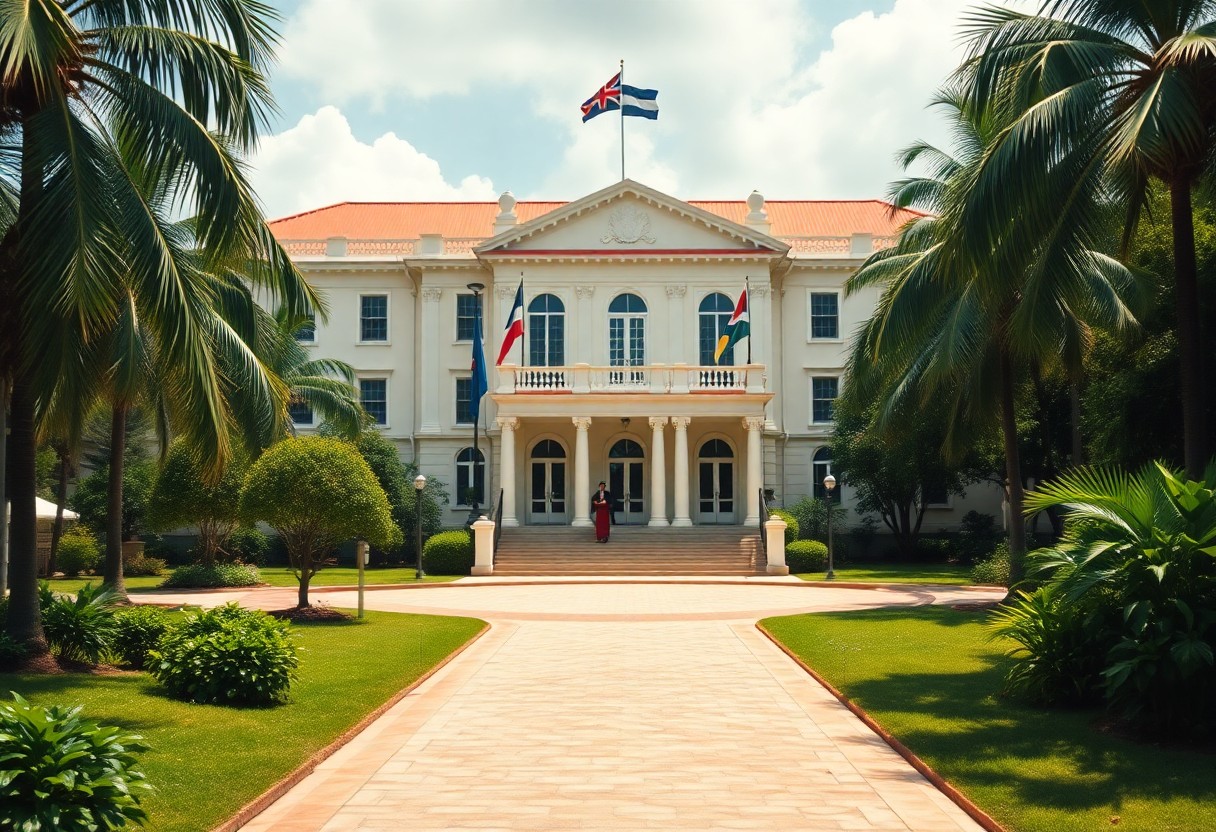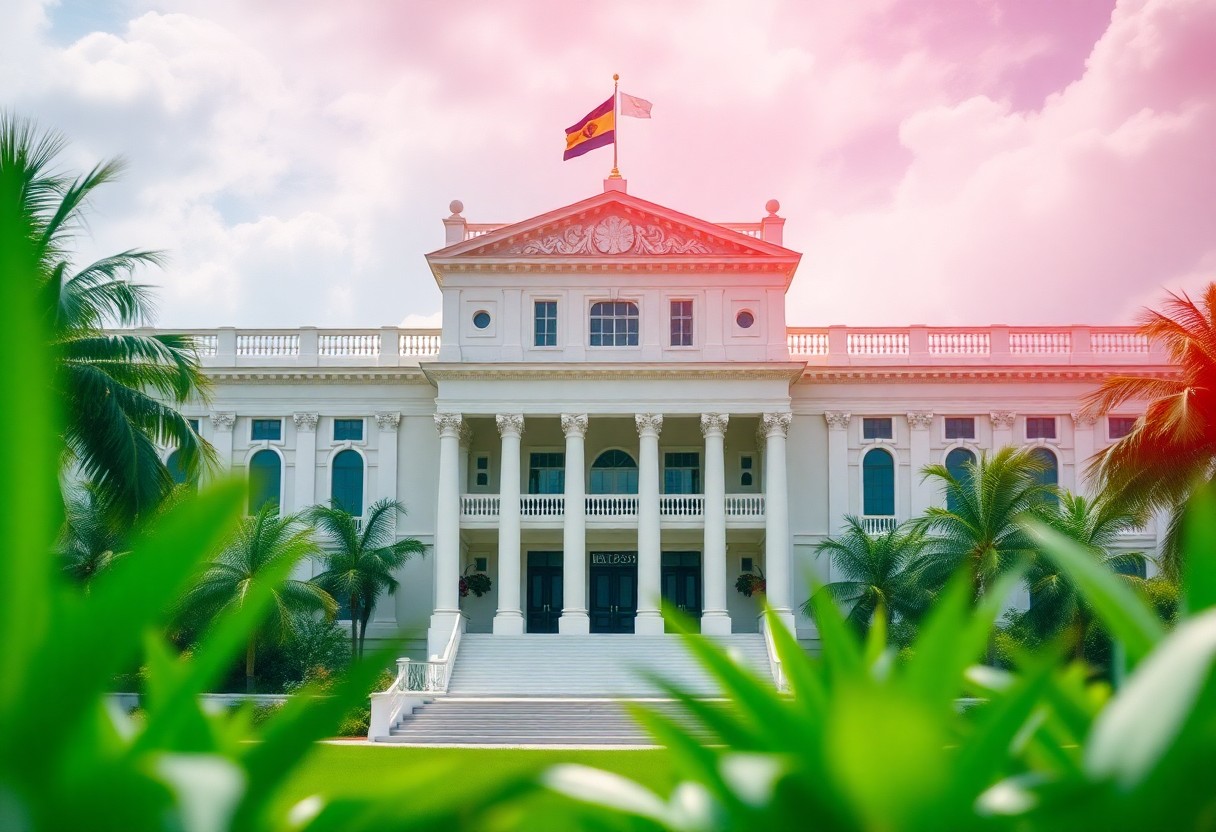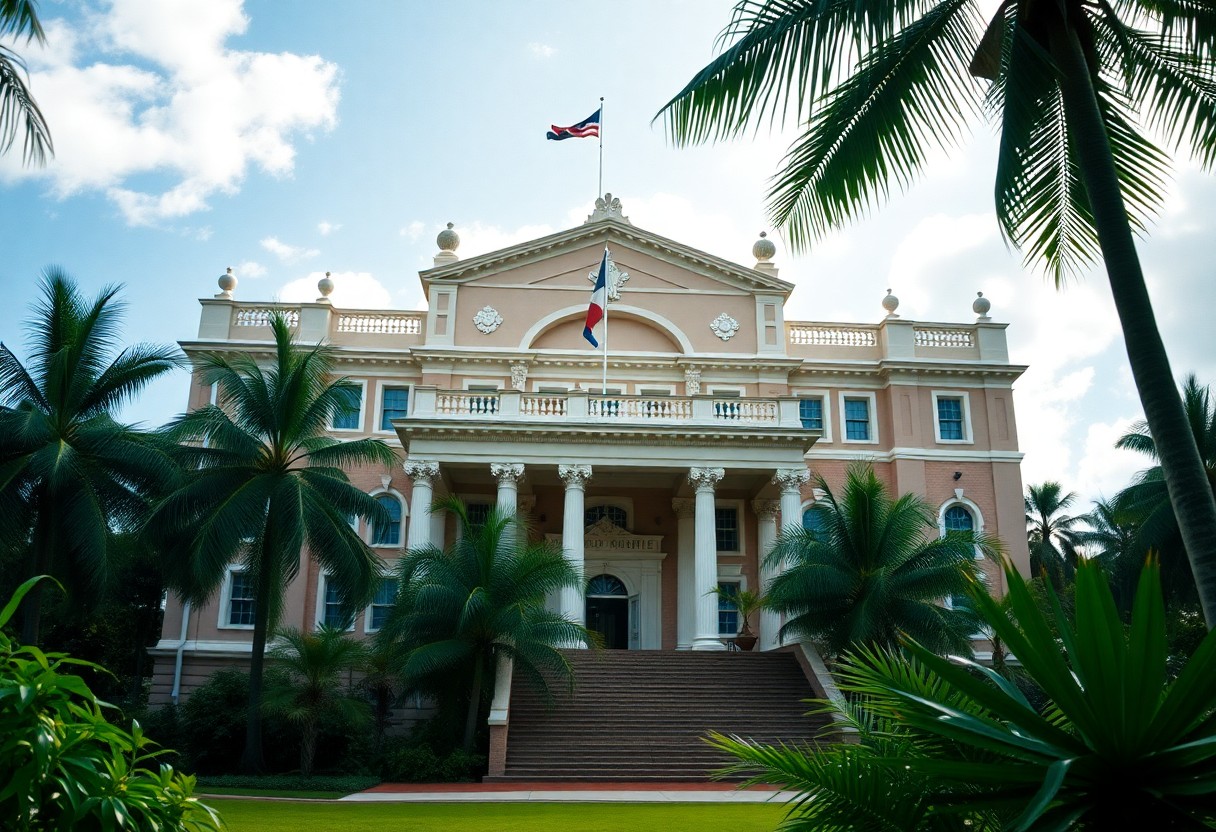Embark on an enlightening exploration of the intricate political evolution of Belize, where a compelling narrative unfolds, highlighting the enduring influence of colonial legacies on the governance of this dynamic nation. This investigation seeks to uncover the intricate layers of Belize’s political framework, deeply rooted in its colonial heritage while enriched by its ongoing quest for autonomy, cultural identity, and self-determination.
The captivating journey of Belize’s transition from British colonial rule to a fully independent nation is vital for comprehending its present political landscape. The substantial reforms instituted by the British colonial administration have left an indelible mark on Belize’s institutional frameworks and democratic practices. As you delve into this historical narrative, you will uncover the profound evolution from British Honduras to a sovereign state, characterized by constitutional structures influenced by British parliamentary traditions. The legacy of British governance and legal systems has been instrumental in shaping contemporary leadership in Belize, resulting in a multifaceted political environment that strives to harmonize indigenous viewpoints with colonial histories.

Unveiling the Historic Transition: From British Honduras to Contemporary Belize
The political metamorphosis of Belize, evolving from British Honduras to an independent nation, epitomizes a remarkable narrative filled with significant shifts in governance. You will delve into how colonial governance fundamentally reshaped the foundational elements of the country’s institutional architecture. The lasting impact of British rule has substantially influenced Belize’s political structure, establishing administrative frameworks that continue to resonate even after achieving independence in 1981.
Chronological Overview: The Journey from Colonization to Independence in Belize
A pivotal chapter in Belize’s history commenced with the establishment of British territorial claims in the 17th century, progressing through formal colonial recognition in 1862, and culminating in a meticulously negotiated pathway toward self-governance. You will learn how diplomatic strategies, strategic negotiations, and unwavering advocacy propelled the transformation of British Honduras into the independent nation of Belize, marking a significant milestone in the broader narrative of Caribbean decolonization.
The Evolution of Political Mechanisms: A Historical Examination
In 1862, the introduction of British administrative frameworks initiated a transformative alteration in Belize’s governance environment. You will discover how the gradual implementation of Westminster-style parliamentary mechanisms laid a solid foundation for the emergence of modern political institutions. This transformation extended beyond mere administrative reform; it represented a comprehensive rethinking of governance that has significantly influenced Belize’s political character.
The effects of colonization on Belize’s governance were profound and far-reaching. British colonial administrators instituted intricate bureaucratic frameworks that would decisively influence the nation’s political journey. You will appreciate how the legal frameworks, administrative practices, and governance mechanisms introduced during colonial times became firmly embedded within Belizean society, establishing a legacy that surpassed mere territorial control and fundamentally altered societal power dynamics.

The Profound Influence of the English Language on Belizean National Identity
Belize’s rich linguistic heritage stands as a powerful testament to its British colonial past. English remains the official language, signifying the country’s historical connections to the United Kingdom. This linguistic inheritance not only facilitates effective communication but also embodies the persistent British influence on Belizean national identity, ensuring a seamless continuity of administrative and cultural practices across generations.
Legal Foundations: The Lasting Impact of British Common Law on Governance
The intricate legal framework of Belize directly reflects its British colonial heritage. British common law principles serve as the foundation of Belize’s judicial system, providing a structured approach to legal interpretation and the establishment of precedents. You will observe how this inherited legal system upholds values of transparency and fairness while employing systematic methodologies for addressing judicial matters, preserving the sophisticated legal traditions that were introduced during the colonial era.
Educational Frameworks and Cultural Influences Shaping Belize
The education system in Belize unmistakably mirrors British influence, with academic institutions adhering to British-style curricula that emphasize structured learning methodologies and comprehensive educational standards. This educational approach continues to foster intellectual growth, preserving ties to colonial educational traditions while equipping students to meet global academic challenges successfully.
Moreover, the British impact on education transcends mere curricular frameworks. You will discover that cultural exchanges, pedagogical methodologies, and intellectual paradigms introduced during colonial times have dramatically reshaped Belize’s educational ecosystem. The integration of British teaching approaches has cultivated a distinctive learning environment that harmonizes local cultural nuances with international educational standards, ultimately nurturing a generation of critical thinkers who are globally competitive.
The Contemporary Role of the British Monarchy in Belizean Society
In today’s society, the British monarchy retains a nuanced connection with Belize, symbolizing a complex postcolonial relationship. Queen Elizabeth II served as the head of state until 2022, with King Charles III currently representing Belize as its constitutional monarch, symbolizing the deep-rooted historical ties that persist between the two nations. This relationship signifies more than just a diplomatic formality; it encapsulates a profound historical connection that continues to influence Belizean governance and national identity.
The Ceremonial Functions of the Governor-General in Belize’s Governance
Within Belize’s governmental framework, the Governor-General acts as the direct representative of the monarchy, appointed by the King upon the recommendation of the Belizean Prime Minister. You will find that this role is primarily ceremonial, encompassing constitutional responsibilities such as appointing government officials, endorsing legislation, and representing the state during official functions. This position helps maintain a symbolic connection to Belize’s colonial history while ensuring constitutional continuity within the governance framework.
The Symbolic Importance of the Monarchy in Belizean Culture
The significance of the British monarchy in Belize extends beyond formal governance structures, representing a complex historical narrative. You will come to understand that this relationship embodies both colonial legacies and contemporary diplomatic relations, serving as a tangible reminder of Belize’s unique historical journey. The monarchy signifies continuity, tradition, and the intricate postcolonial relationships that shape national identity.
To fully appreciate the comprehensive significance of the monarchy’s symbolism, it is vital to recognize its multifaceted role within Belizean society. The connection to the British royal family represents more than a historical remnant; it serves as a living testament to Belize’s intricate national narrative. You will find that this relationship offers a nuanced perspective on national identity, cultural heritage, and diplomatic interactions. The monarchy acts as a bridge linking Belize’s colonial past with its independent present, providing a unique lens through which to view national development and international relations.
Here’s the content for your blog post section:
Gaining a Deeper Understanding of Political Identity in Belize
The political identities in Belize emerge from a rich tapestry woven from colonial history and post-independence transformations. You will discover that the nation’s governance reflects a unique fusion of British administrative frameworks and indigenous political aspirations. The Westminster parliamentary system remains a foundational element of Belize’s political landscape, showcasing the lasting impact of British colonial governance on contemporary Belize.
Belize’s Role within the Commonwealth Community
At the core of Belize’s international affiliations lies its membership in the Commonwealth, signifying an ongoing connection to its British colonial heritage. You can observe how this relationship offers diplomatic advantages and preserves historical ties, allowing Belize to engage within a network of nations that share similar administrative traditions and diplomatic interests.
Navigating Complex Diplomatic Relations with Neighboring Countries
Belize’s regional interactions reveal a multifaceted diplomatic environment. You will note that Guatemala’s territorial claims have historically complicated bilateral relations, generating tension along shared borders. The nation adeptly navigates these challenges through diplomatic channels and international mediation efforts.
Neighboring countries significantly influence Belize’s geopolitical dynamics. The long-standing territorial dispute with Guatemala represents the most intricate international challenge, while relationships with Mexico and other Central American nations remain largely cooperative. You will find that Belize actively engages in strategic diplomatic initiatives, leveraging its unique position to promote regional stability and foster economic collaboration.

Exploring the Economic Ramifications of Colonial Influences in Belize
Belize’s economic landscape reveals notable traces of British colonial influence. The systematic economic structures established during the colonial era have fundamentally shaped the nation’s financial trajectory, creating enduring patterns of trade, resource distribution, and economic governance that continue to affect Belize’s economic relationships today.
The Development of Trade and Commerce Under British Rule
During the period of British colonial governance, you would witness a dramatic restructuring of Belize’s economic systems. Maritime trade routes were strategically developed, positioning Belize as a crucial commercial hub in Central America, with mahogany exports and agricultural products serving as key drivers of economic interaction with global markets.
Modern Economic Policies Rooted in Colonial Legacies
Within the framework established by British colonial governance, you can observe how modern economic policies in Belize reflect inherited administrative and financial systems. The legacy of British economic models continues to shape financial regulations, trade agreements, and strategies for sustainable economic development.
To truly understand Belize’s current economic landscape, it is crucial to recognize how colonial administrative practices redefined economic interactions. The British introduced systematic financial governance, property rights frameworks, and international trade protocols, which remain integral to modern Belizean economic policy, establishing a lasting institutional infrastructure that guides current economic decision-making processes.
The Interplay of Social Dynamics and Governance in Belize
Unlike many other post-colonial nations, Belize’s governance is characterized by a complex interplay between historical British administrative frameworks and indigenous cultural dynamics. You will find that the political landscape is deeply rooted in a unique blend of colonial heritage and local adaptations. The parliamentary system inherited from British rule continues to shape governmental processes while simultaneously incorporating local perspectives and evolving democratic practices that reflect Belize’s diverse societal composition.
Ethnic Diversity and Political Representation within Belize
Representation within Belize’s political system acts as a vital mechanism for balancing diverse ethnic identities. You will observe how Creole, Garifuna, Maya, and Mestizo communities actively participate in political processes, ensuring that governmental structures support inclusive decision-making frameworks. The electoral system strives to provide equitable platforms for various ethnic groups, fostering a collaborative national identity that transcends historical divisions.
The Role of Civil Society in Strengthening Governance
The diversity present within civil society organizations serves as a key catalyst for promoting democratic engagement in Belize. You will discover how grassroots movements and community networks actively shape policy-making processes, creating avenues for citizen participation that extend beyond traditional electoral frameworks. These organizations play an essential role in amplifying marginalized voices and advocating for transparent governance.
This intricate web of civil society organizations functions as a sophisticated mechanism for ensuring democratic accountability. You will find that non-governmental organizations, community groups, and advocacy networks serve as crucial intermediaries between citizens and government institutions. Their strategic involvement in policy discussions, social development initiatives, and human rights advocacy exemplifies a robust approach to fostering responsive and representative governance within Belize’s evolving political landscape.
Exploring the Complexities of Belize’s Political Landscape
In summary, Belize’s political landscape bears the indelible marks of British colonial influence. Your insights into the nation’s governance reveal a complex tapestry woven from historical legacies, where parliamentary systems, legal frameworks, and administrative structures directly reflect the British administrative model. As you examine Belize’s political evolution, you will recognize that the British impact extends far beyond administrative mechanics, fundamentally shaping the country’s democratic principles, institutional foundations, and national identity. The ongoing connection between Belize’s past and present illustrates how colonial heritage continues to inform contemporary political dynamics, providing you with a nuanced understanding of postcolonial governance.
Addressing Frequently Asked Questions
Q: How did British colonial administration fundamentally transform Belize’s governmental structure?
A: The British colonial era established a parliamentary system in Belize, introducing administrative frameworks that persist today. British governance implemented centralized administrative models, creating bureaucratic institutions that would later form the backbone of Belize’s independent government structure. The Westminster parliamentary model became a direct template for Belize’s political organization following independence in 1981.
Q: What specific legal systems did British colonizers introduce to Belize’s governance?
A: British colonial administrators implemented common law principles, establishing a judicial system based on English legal traditions. This included forming court structures, codifying legal procedures, and introducing constitutional frameworks that emphasized the rule of law. The British legal heritage has significantly shaped Belize’s judicial institutions, with many original colonial legal statutes still in effect in contemporary Belizean governance.
Q: In what ways did British colonial policies impact Belize’s ethnic and administrative diversity?
A: British colonial strategies intentionally developed administrative structures that recognized Belize’s multiethnic population. The colonial administration established divisions that acknowledged diverse cultural groups, including Creole, Garifuna, Maya, and Mestizo communities. These policies laid the groundwork for inclusive governmental representation, ensuring that multiple ethnic perspectives could engage in national decision-making processes following independence.
The Article Unraveling Belize’s Political Ties: How the British Legacy Shaped Modern Governance appeared first on Belize Travel Guide
The Article Belize’s Political Ties: The Impact of British Legacy Was Found On https://limitsofstrategy.com